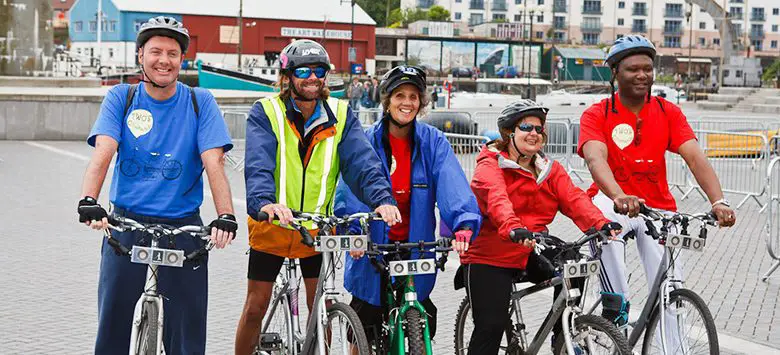
One third of disabled people in UK cities would like to start cycling
An estimated 84% of disabled people living in the UK’s biggest cities never cycle for local journeys, yet one third (33%) say they would like to start cycling. The significant interest in everyday cycling is mirrored amongst other demographic groups, including women (32%) and people over 65 years old (15%).
The ‘Inclusive cycling in towns and cities’ report, published at the beginning of June by the walking and cycling charity Sustrans, and Arup, an engineering and design consultancy, highlights that women, older and disabled people continue to be neglected in cycling.
This is despite the UK having a legal obligation through the Equality Act 2010 to protect everyone from discrimination in wider society.
The report uses data from Bike Life 2017, the largest assessment of cycling in seven major cities. This is paired with interviews of 12 focus groups consisting of women, older people and disabled people with reduced mobility, learning difficulty, hearing loss, partial sight, or mental health conditions.
It finds that people from these demographic groups face systematic barriers to either beginning to cycle, or to cycling more, including:
- An association that cycling isn’t an activity for people like ‘them’.
- Heightened safety concerns when sharing road space with motor vehicles.
- Lack of seamless and dedicated cycle infrastructure to connect people to everyday destinations suitable for different types of cycles.
- Access to and the high cost of adapted cycles, including electric cycles, and where government support exists e.g. through the cycle to work scheme, it is only available to those in employment.
Interestingly, many participants who cycle only do so for leisure, as they can choose their own routes through parks or along familiar quiet roads. This means cycling to everyday destinations like work, school, the shops and community services is out of the reach for them.
Barriers to cycling can also often affect people’s independence and confidence to travel, and, in some cases, push people into isolation.
The report sets out a number of recommendations for towns and cities, including:
- Ensuring the voices of underrepresented groups are integrated into policy and planning.
- Creating a dense network of cycling routes within and around where people live and amenities.
- Reducing through traffic in local neighbourhoods to improve safety.
- Better access to cycle training and to adapted cycles.
Sustrans and Arup will use the initial findings from the report as the basis for further work to engage with organisations representing women, older people and disabled people to inform the transport sector to make urban cycling fully inclusive.
Xavier Brice, CEO for Sustrans, said: “Inclusive transport is at the heart of a fairer society, and cycling can play a vital role in enhancing social inclusion. Sadly, in the UK an estimated 70% of the population can face systemic barriers to cycling, which shape and often limit their mobility, life opportunities and independence.
Our urban areas are predominantly designed around the car and only those brave enough to share road space with motor traffic currently consider cycling as a mode of transportation.
However, women, disabled people and older people, who on average are less likely to regularly drive, suffer from the impact motor vehicles create, such as congestion and air pollution, which is damaging their health and wellbeing.
This report acknowledges that the UK can achieve big social changes. While it’s clear central governments need to show leadership and prioritise investment in cycling, we urge cities and towns to work with us to make cycling inclusive, safer and attractive for more people, regardless of gender, age and abilities.”
One participant with reduced mobility from Greater Manchester said: “If I had an adapted bike, I think I would feel less disabled and feel a bit cooler. I would feel more confident getting out and about.”
By Sustrans
More on Disability Horizons…
I miss riding a bike. I never got to drive because I’ve got epilepsy, but when my epilepsy got a lot worse at 17 I had to stop cycling for safety – it’s been the bigger pain to deal with.
Let me offer a suggestion, Joe. If you search for my name (Nick Cole) on the Disability Horizons website, you can read about my struggle to feed my cycling habit despite my stroke. In fact, I used it to set goals and targets which, I was taught in the rehab unit, are essential for getting back to something like a normal life. If you go cycling in parks and off-road with a recumbent trike and you do have an epileptic fit, assuming you have a carer with you, the fact that you are in a trike doesn’t put you at any disadvantage. Recumbent trikes are fitted with handbrakes which can hold you on any incline
Read it and you’ll maybe get cycling again and avoid some costly mis-steps!